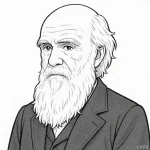“The true and the approximately true are apprehended by the same faculty; it may also be noted that men have a sufficient natural instinct for what is true, and usually do arrive at the truth. Hence the man who makes a good guess at truth is likely to make a good guess at probabilities.”

- 384 BC – 322 BC
- Originating from Macedonia in ancient Greece
- Philosopher and scientist, founder of the Lyceum academy
table of contents
Quote
“The true and the approximately true are apprehended by the same faculty; it may also be noted that men have a sufficient natural instinct for what is true, and usually do arrive at the truth. Hence the man who makes a good guess at truth is likely to make a good guess at probabilities.”
Explanation
In this quote, Aristotle suggests that both truth and probability are perceived through the same mental faculties—our ability to reason and make judgments. He argues that humans possess a natural instinct or ability to discern what is true, even when the truth is not immediately obvious. This innate capacity for recognizing truth allows us to form reasonable conclusions about what is likely or probable, even when we lack complete information. Aristotle asserts that a person who is skilled at recognizing the truth in complex situations will likely be good at evaluating and estimating probabilities, since both require a similar process of reasoning and judgment.
This idea remains highly relevant today in fields like decision-making, logic, and probability theory. The ability to reason effectively is key to making sound judgments about what is true and what is likely to happen, whether in science, business, or everyday life. For example, someone who can accurately assess a situation and arrive at the truth is also likely to be skilled at evaluating the probabilities of various outcomes based on available data or past experiences.
For instance, a scientist who is able to determine the truth of a hypothesis through experiments will likely be adept at predicting the outcomes of future experiments or estimating the likelihood of a particular event happening. Similarly, a business leader who has a strong sense of what is true about market trends can make accurate predictions about the future and plan accordingly. Aristotle’s quote underscores the importance of logical reasoning and intuition in guiding us toward truth and making reasonable predictions in uncertain situations.
Would you like to share your impressions or related stories about this quote in the comments section?




